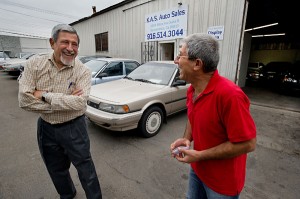 By Richard Chang, McClatchy Newspapers –
By Richard Chang, McClatchy Newspapers –
SACRAMENTO, Calif. — For Kamal Mansoor, a small sum of money made all the difference. In 2011, the Iraqi immigrant received a $15,000 loan from Opening Doors Inc., a microlender in Sacramento — exactly what he needed to open K.A.S. Auto Sales.
“I got lucky with them,” Mansoor said. “They worked with me on the business plan.” A jeweler by training, Mansoor, 52, came to the United States in 2010.
(PHOTO: Kamal Mansoor, right, talks with David Blicker, the executive director of Opening Doors, a microlender which lends to business too small, or too risky for banks. Mansoor received a loan from the lender to start his auto sales business. )
Today, he sells four to six used cars a month from his lot, netting an average profit of $300 per car.
Long associated with third-world countries, microlending is gaining U.S. popularity. Lenders provide small loans, usually $50,000 or less, to customers who often could not get funded by banks.
Opening Doors has been making such loans for the past decade to refugees and immigrants like Mansoor. Now, armed with a $300,000 loan from the U.S. Small Business Administration, it is opening the program up to all comers.
“We are doing in the community what banks can’t or won’t do,” said David Blicker, Opening Doors’ executive director. “We know from our experience there are people who, with a $15,000 loan, can make a business more successful.”
Out to make a profit, traditional lenders often shun customers like Mansoor. Overhead costs associated with making a loan are the same, regardless of the amount, according to Blicker. Startup companies are also more likely to fail.
“They don’t like to make these small loans because they can’t make money on it,” Blicker said. “They incur the same expense if it was a $250,000 or a $50,000 loan.”
Originally a refugee resettlement agency, Opening Doors expanded its services in 2002 to include microlending and business assistance, largely serving refugees and immigrants wanting to start a small business. Funded by the U.S. Office of Refugee Resettlement, the two- to three-year loans ranged from $5,000 to $15,000, with interest rates at 7.5 percent, Blicker said.
Blicker said the default rate has been low — less than 1 percent for the past year. But not everyone can qualify for a microloan. Opening Doors evaluates candidates based on their business plan, credit history, debt-to-income ratio and other factors.
Under the new program, the interest rate will be about 8 percent.
Microlending has the support of some big banks, who hope that recipients will eventually “graduate” to traditional loans. Last year, for instance, Wells Fargo contributed $40,000 to support Opening Doors.
“These programs can create jobs in the community,” said Donald Terry, Wells Fargo’s vice president of community development in Northern California. “It allows small businesses to eventually gain access to mainstream lending.”
The ongoing credit crunch, which cut off bank loans for many businesses, has allowed microlending to expand in Sacramento, said Heidi Pickman, spokeswoman for the California Association for Micro Enterprise Opportunity, or CAMEO, a microlending trade association.
CAMEO reports that in 2010, its 28 members made approximately 1,200 microloans, totaling $15 million. Though figures for 2011 are not yet available, Pickman says the number of microloans picked up “substantially,” because of the improving economy.
The microlending boom has caused concern among state regulators, who cite opportunities for fraud.
“It’s always good to check with us to see if the microlender is licensed,” said Mark Leyes, a spokesman for the California Department of Corporations. “The anonymity of the Internet makes it harder to verify people’s backgrounds and certainly their intentions.”
For Mansoor, microlending has been a “life-changer.” He started repayment in November 2011, a month after he took the loan. He has since referred two friends to the program, including one who has opened an auto detail shop.
“People need a little help becoming self-sufficient,” Blicker said. “We’re here to help them get there.”







We could use something like this in North Iowa.